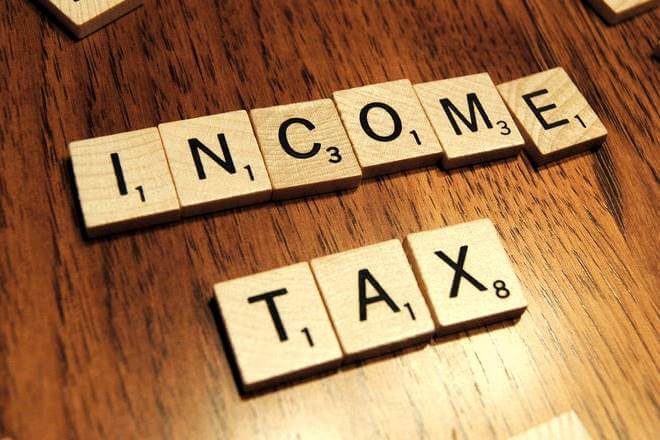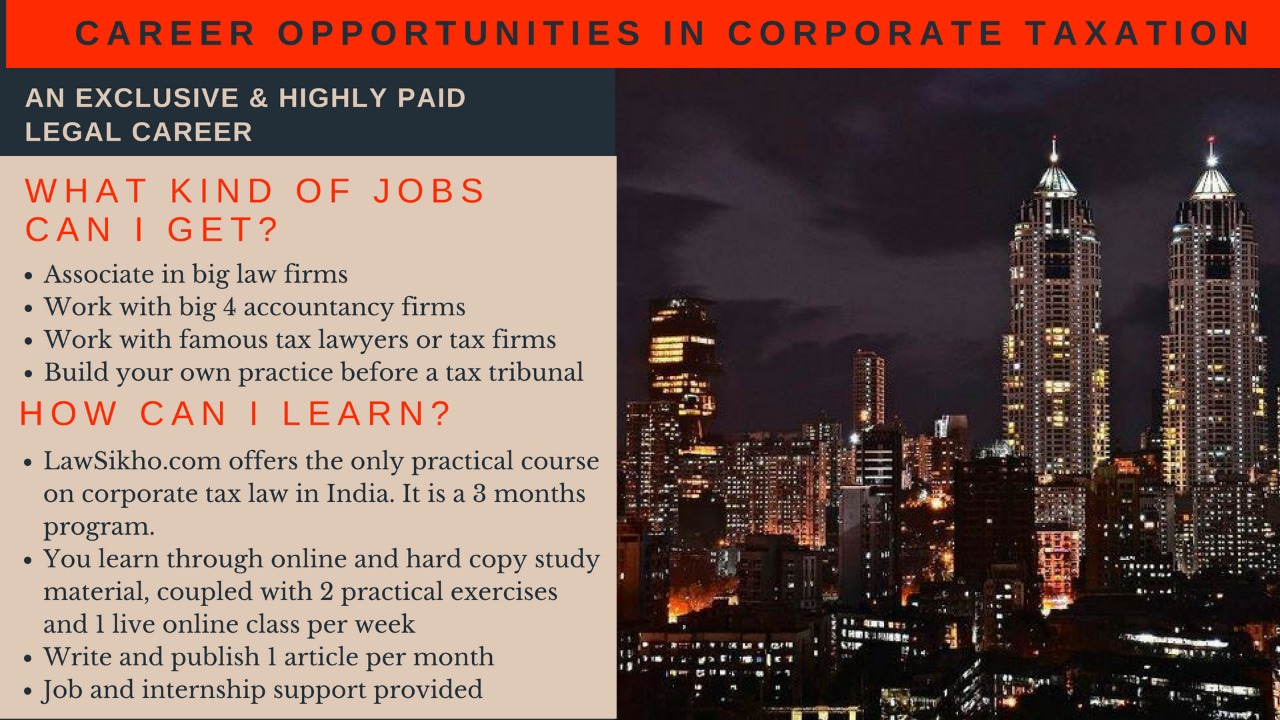This article is written by Palak Shah, pursuing a Certificate course in Advanced Corporate Taxation from Lawsikho.
Table of Contents
Introduction
There are different types of salaries as specified by the Income Tax Department and they can be generally divided into five categories of income – salary income, house and property income, company or occupation profits or gains, capital gains income and, finally, income from other additional sources. The income tax extracted from these incomes involves different processes and therefore it is important to identify them smartly so that the correct measurement and deduction methods are followed which are prescribed separately for each category. There are some points of uncertainty that may occur in these income demarcations between the income from various occupations and companies and the income from the capital stocks and shares of the investment commodities. Some may come to the conclusion that the essence of these transactions depends on the investment intent and also the transaction frequency. In addition, the transactions can be further interpreted as speculative or non-speculative in the case of a commercial transaction. The word as such is complicated and this article will provide you with a detailed guide to speculative earnings.
What is speculative income?
Speculative income has no particular definition among the words specified by the Income Tax Act, but the term derives from the word ‘speculative transaction’ itself. The income obtained from speculative transactions can be considered to be speculative income. To understand speculative income, an understanding of speculative transactions needs to be delved into.
What is speculative business and speculative transactions?
Explanation 2 to Section 28 of the Income-tax Act, 1961 (“Act”) provides – Where speculative transactions carried on by an assessee are of such a nature as to constitute a business, the business (hereinafter referred to as “speculation business”) shall be deemed to be distinct and separate from any other business. Further, Explanation 2 to Section 28 specifically provides that where an assessee carries on speculative business, that business of the assessee must be deemed as distinct and separate from any other business. This becomes necessary because S. 73 provides that losses in speculation business, unlike other business, cannot be set-off against the profits of any business other than a speculation business. Likewise, a loss in speculation business carried forward to a subsequent year can be set-off only against the profit and gains of any speculative business in the subsequent year. Profits and losses resulting from speculative transactions must, therefore, be treated as separate and distinct from other profits and gains of business and profession.
On the other hand, to describe the expression “speculative transaction,” one may understand that the term implies a transaction in which the contract involving the purchase or selling of some product such as stocks and shares is agreed regularly or ultimately rather than the actual delivery or transfer of the goods or scripts. One of the most common examples will be profits from intraday trading. The word ‘intra-day trading’ means shares exchanged within the same day. Considering the intra-day exchange of shares, one finds that on the same date there is actually no entry or exit from the trading account, and thus no entry into the DEMAT account at all. Hence no deliveries can be referred to as speculative transactions in the case of intra-day trading and therefore the scenario.
What are the exceptions to a certain transaction to be considered as “Speculative”?
Although there are many situations where a transaction may be called “speculative,” it is important to have a clear understanding of what cannot be treated as speculative transactions. The exceptions are as follows –
- Hedging contract with respect to raw materials or merchandise – A person might enter into a contract in the course of his manufacturing or merchandise business and in respect of the raw materials and merchandise, in order to guard them against loss which might be feared of due to price fluctuations in future in respects of his contracts for actual delivery of the goods manufactured or merchandise sold by him. Thereby, the procedure of hedging a contract here means saving goods from future loss and this is not a speculative transaction.
- Hedging contract in stocks and shares aspect – Much like the above example, here the individual is in a contract with his stocks and shares entered into by a dealer or investor to protect them from the loss due to future price fluctuations.
- Forward contract – A forward market is described as an over-the-counter market place and one of the key tasks here is to set the price of a given financial instrument or to settle on an asset for future delivery. A forward contract is one signed by a member of a forward market (or stock exchange) and secured against any liability that may occur in the course of any trade in the nature of employment or arbitration. Jobbing ensures that all transactions are squared off on the same day, and arbitration means buying a product or security in one market and then selling it immediately in another.
- Trading in derivatives – A qualified transaction is a transaction conducted electronically on approved exchanges as specified by applicable legislation, this transaction is accompanied by a time-stamped contract note indicating a specific customer identification number and PAN (Permanent Account Number). This transaction in respect of derivatives trading is referred to in the Securities Contracts (Regulation) Act, 1956, and is performed in approved stock exchanges.
- Commodity derivatives trading – It is an eligible transaction (carried out electronically on screen-based systems through registered member or intermediary as per relevant statutes and which is supported by a time stamped contract note indicating unique client identity number, unique trade number and PAN) in respect of trading in commodity derivatives carried out in a recognized association, which is chargeable to commodities transaction tax under Chapter VII of the Finance Act, 2013.
What is the treatment of loss from speculative business?
To measure provisions on losses, it is important to treat speculative business as a distinct and separate business. Section 73 of the Income Tax Act, notes that investment business losses can only be compensated against the earnings of the speculative sector and, despite this, it is quite rare that any other sector loss can be compensated against other business profits. It must be remembered that the losses from speculative business can be carried forward to a subsequent year, and can be set-off only against the benefit and profits of the speculative business in the following year, respectively. It is important not only to treat speculative business as a separate and separate business but also to treat the profits and losses resulting from the respective speculative business as separate and distinct from other profits and gains resulting from the company or career.
It should be noted that loss from the speculative sector cannot be carried forward for a period exceeding four review years after the year in which the loss was incurred. Moreover, if there is any investment and depreciation in the scientific research process, whether the depreciation or capital expenditure is carried out in the speculative sector, it is to be set off first.
Provisions laid down in the Income tax law concerning the carry forward and set off of loss from speculative business
If loss of any speculative company in the year in which it is sustained cannot be completely corrected, then the unadjusted loss may be carried forward for adjustment in the coming year. Such losses may be measured in subsequent years only against speculative business profits (maybe the same or some other speculative sector); Losses from the speculative activity will only be carried forward if the income/loss return of the year in which the loss is incurred is furnished on or before the due date of the return as provided in section 139(1) of the Act. No loss to be carried forward past four years of review that immediately follows the year the loss was sustained. With regard to the allowance on the count of depreciation and capital expenditure made on the basis of scientific research, the provisions referred to in sub-section ( 2) of Section 72 relating to investment business as is done in any other undertaking.
Where, for any assessment year, any loss assessed in respect of the speculation business has not been completely compensated in compliance with subsection ( 1), and a substantial part of the loss is not paid where the assessor has no income from other speculative business and is thus subject to other provisions of the clause, and is thus carried forward to the following assessment year-
(1) If any, it would be put against the earnings from the trading company carried on by him and is assessable for that appraisal year.
(2) If the loss incurred cannot be completely compensated, then the balance of the loss shall be carried forward to the next appraisal year.
Audit for income from speculative business
Audit to S. 44AB is necessary if the turnover exceeds Rs.1 crore. But turnover is measured in the following way in the case of speculation company, equity trading, and futures/options.
1) Speculative Business – The sum of both positive and negative variations should be known as turnover.
2) Intraday share exchange – The sum of both positive and negative discrepancies is to be known as turnover.
3) Delivery-based exchange of securities – Value of sale or value of purchase that is large is known as turnover.
4) Futures – The sum of both positive and negative variations shall be known as the turnover.
5) Options – Premium options earned on sale are also to be included in turnover.
Eg:
|
Purchases |
Sales |
Difference (Profit or Loss) |
|
|
Trade 1 |
2,00,000 |
2,50,000 |
50,000 |
|
Trade 2 |
1,75,000 |
1,50,000 |
25,000 |
|
Total of differences |
75,000 |
As per the above table, after Trade 1 the trader makes a profit of Rs 50,000 and after the Trade 2, the trader makes a loss of Rs. 25,000 and as per S.44AB the total turnover is considered as an aggregate of the differences which is Rs. 75,000.
Conclusion
One should appreciate that speculative income is a complicated business, which can be very dangerous at times. As a speculative or regular corporation, the taxpayer has to take care of multiple transactions and their real reputation. It is necessary to decide if risky transactions within the agreed legalities will really operate to good profits. There are many transactions that are misinterpreted or mistaken as risky transactions depending on the non-delivery of shares and goods, and often based on the business’ “purpose.” To decide which transaction is speculative, one should be through with all the clauses and file their taxation and other official purposes accordingly.
References
- Income Tax Act, 1961
- https://cleartax.in/s/speculative-income
- https://medium.com/nitinjogad/tax-treatment-on-loss-from-speculative-and-non-speculative-business-bb996c40198e
- https://taxguru.in/income-tax/understanding-44ab-tax-audit.html
- https://taxguru.in/income-tax/how-to-compute-turnover-in-case-of-future-and-options-trades-speculation-trades-and-applicability-of-tax-audit-us-44ab-of-the-income-tax-act-1961.html
Students of Lawsikho courses regularly produce writing assignments and work on practical exercises as a part of their coursework and develop themselves in real-life practical skill.
LawSikho has created a telegram group for exchanging legal knowledge, referrals and various opportunities. You can click on this link and join:
 Serato DJ Crack 2025Serato DJ PRO Crack
Serato DJ Crack 2025Serato DJ PRO Crack











 Allow notifications
Allow notifications


